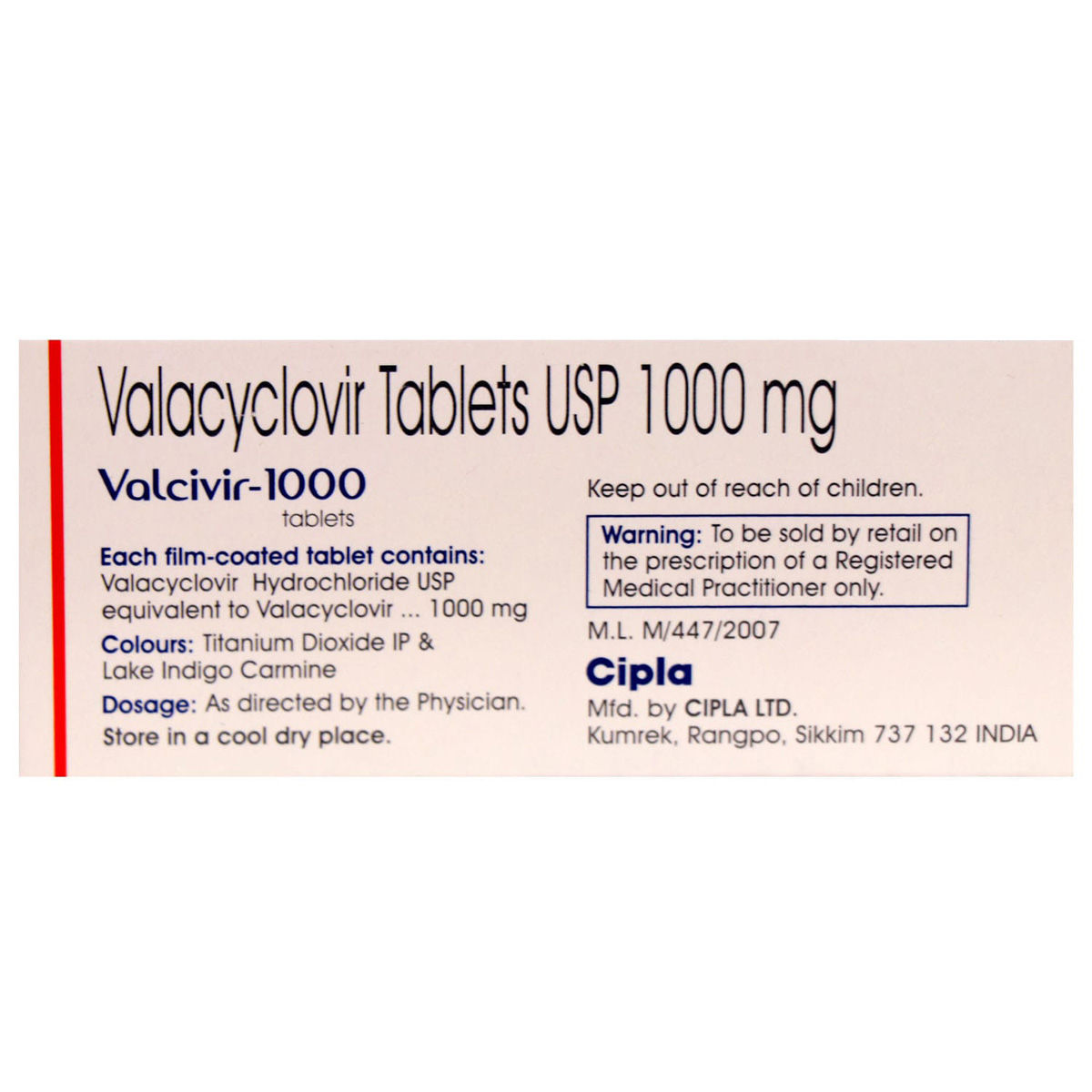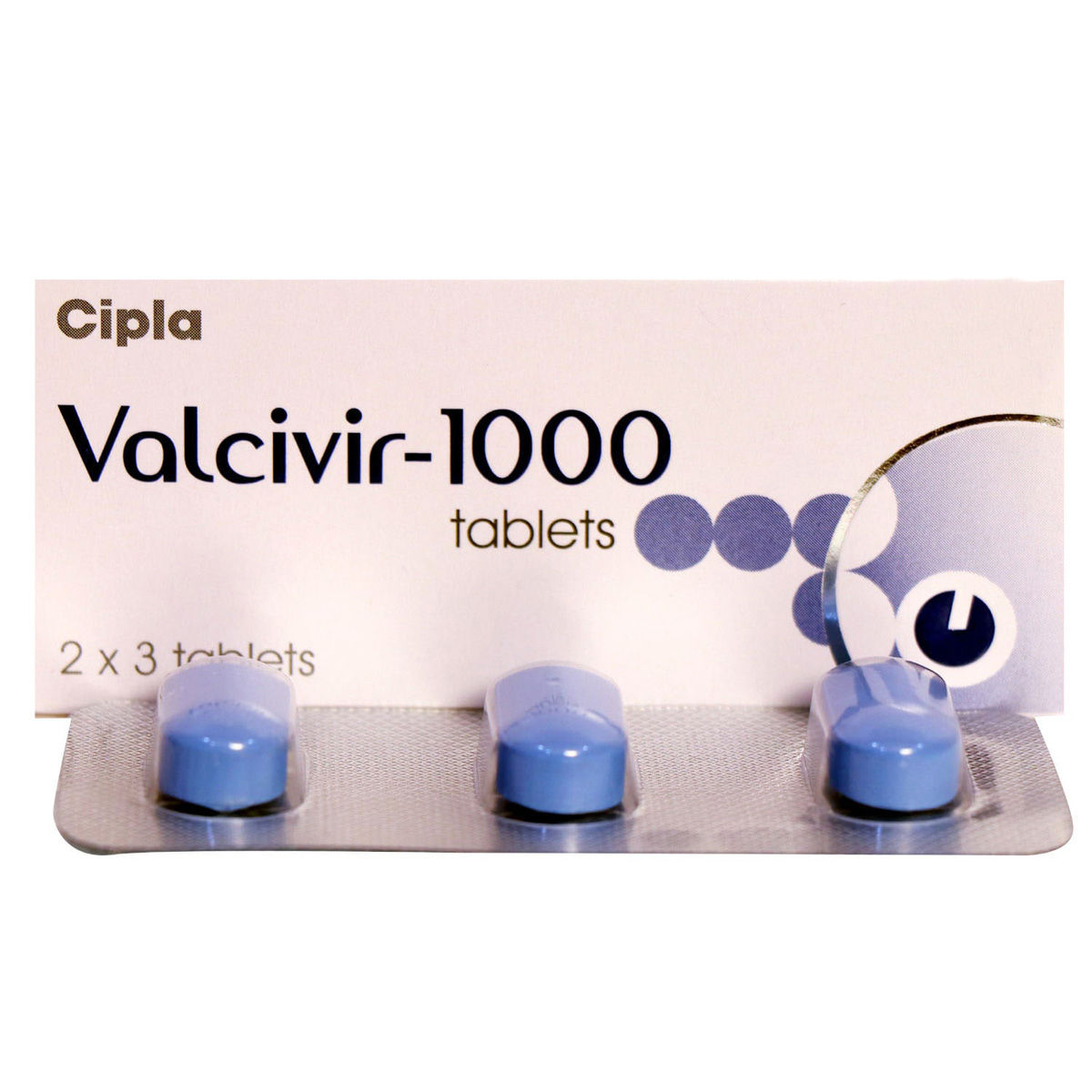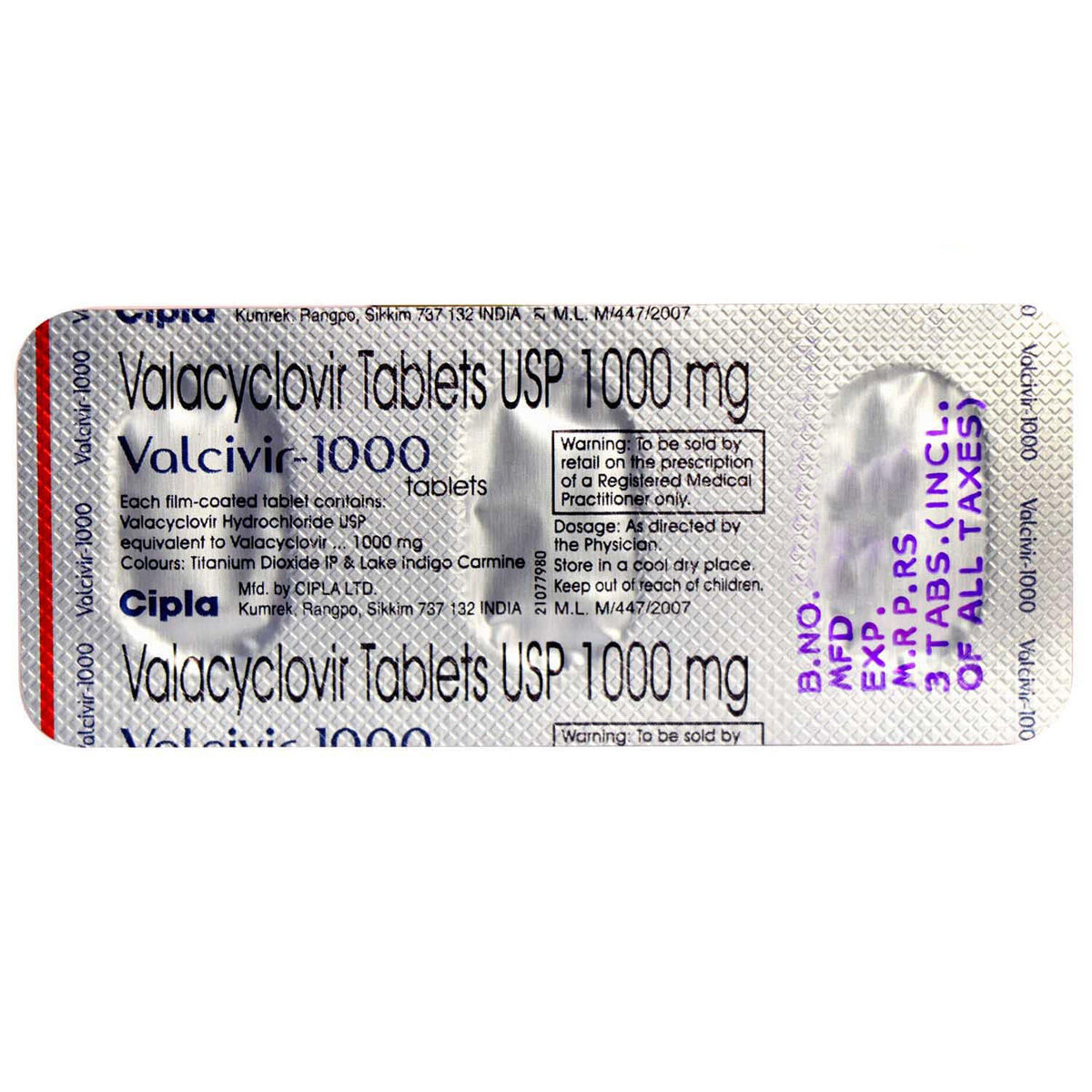वैल्सीविर 1000 टैबलेट 3's





₹362
(Inclusive of all Taxes)
₹54.3 Cashback (15%)
Know Your Delivery Time
Provide Delivery Location
 Prescription drug
Prescription drugWhats That

Secure Payment

India's Most Trusted Pharmacy

Genuine Products
- Inform your doctor about the nausea and discuss possible alternatives to the medication or adjustments to the dosage.
- Divide your daily food intake into smaller, more frequent meals to reduce nausea.
- Opt for bland, easily digestible foods like crackers, toast, plain rice, bananas, and applesauce.
- Avoid certain foods that can trigger nausea, such as fatty, greasy, spicy, and smelly foods.
- Drink plenty of fluids, such as water, clear broth, or electrolyte-rich beverages like coconut water or sports drinks.
- Use ginger (tea, ale, or candies) to help relieve nausea.
- Get adequate rest and also avoid strenuous activities that can worsen nausea.
- Talk to your doctor about taking anti-nausea medication if your nausea is severe.
- Record when your nausea occurs, what triggers it, and what provides relief to help you identify patterns and manage your symptoms more effectively.
- Inform your doctor about your constipation symptoms. They may adjust your medication or advise alternative treatments.
- Stay hydrated by drinking sufficient of water (at least 8-10 glasses a day) to help soften stool and promote bowel movements.
- Increase fibre intake by eating foods high in fibre, such as fruits, whole grains, vegetables and legumes, to help bulk up the stool.
- Establish a bowel routine by trying to go to the bathroom at the same time each day to train your bowels.
- Engaging in regular exercise, like walking or yoga, can support in bowel movement stimulation.
- Consult your doctor if constipation persists, and discuss alternative treatments or adjustments to your medication.
- Hydrate your body: Drink enough water to prevent dehydration and headaches.
- Calm Your Mind: Deep breathing and meditation can help you relax and relieve stress.
- Rest and Recharge: Sleep for 7-8 hours to reduce headache triggers.
- Take rest: lie down in a quiet, dark environment.
- Cold or warm compresses can help reduce tension.
- Stay Upright: Maintain good posture to keep symptoms from getting worse.
- To treat headaches naturally, try acupuncture or massage therapy.
- Over-the-counter pain relievers include acetaminophen and ibuprofen.
- Prescription Assistance: Speak with your doctor about more substantial drug alternatives.
- Severe Headaches: Seek emergency medical assistance for sudden, severe headaches.
- Frequent Headaches: If you get reoccurring headaches, consult your doctor.
- Headaches with Symptoms: Seek medical attention if your headaches include fever, disorientation, or weakness.
- Remember, managing depression as a side effect of medication requires patience, persistence, and collaboration with your healthcare team.
- Tell your doctor about your depression symptoms to adjust medication.
- Consult a therapist or counsel for emotional support.
- Engage in regular exercise to release endorphins (neurotransmitters).
- Practice stress-reducing techniques like meditation and deep breathing.
- Build a support network of friends, family, and support groups.
- Establish a consistent sleep schedule.
- Eat a nutritious diet rich in fruits, vegetables, and whole grains.
- Limit or avoid alcohol and recreational substances.
- Keep a mood journal to track symptoms and progress.
- Avoid taking raw fruits, nuts and vegetables.
- Do not share your personal things with others like toothbrushes.
- Clean the wounds and cuts using soap and water.
- Wash your hands thoroughly and frequently and maintain hygiene.
- Get a good quality of sleep.
- Inform Your Doctor: Notify your doctor immediately about your diarrhoea symptoms. This allows them to adjust your medication or provide guidance on managing side effects.
- Stay Hydrated: Drink plenty of fluids to replace lost water and electrolytes. Choose water, clear broth, and electrolyte-rich drinks. Avoid carbonated or caffeinated beverages to effectively rehydrate your body.
- Follow a Bland Diet: Eat easy-to-digest foods to help firm up your stool and settle your stomach. Try incorporating bananas, rice, applesauce, toast, plain crackers, and boiled vegetables into your diet.
- Avoid Trigger Foods: Steer clear of foods that can worsen diarrhoea, such as spicy, fatty, or greasy foods, high-fibre foods, and dairy products (especially if you're lactose intolerant).
- Practice Good Hygiene: Maintain good hygiene to prevent the spread of infection. To stay healthy, wash your hands frequently, clean and disinfect surfaces regularly, and avoid exchanging personal belongings with others.
- Take Anti-Diarrheal Medications: If your doctor advises, anti-diarrheal medications such as loperamide might help manage diarrhoea symptoms. Always follow your doctor's directions.
- Keep track of your diarrhoea symptoms. If they don't get better or worse or are accompanied by severe stomach pain, blood, or dehydration signs (like extreme thirst or dark urine), seek medical help.
- Avoid driving or operating machinery or activities that require high focus until you know how the medication affects you.
- Maintain a fixed sleeping schedule, create a relaxing bedtime routine and ensure your sleeping space is comfortable to maximize your sleep quality.
- Limit alcohol and caffeine as these may worsen drowsiness and disturb sleep patterns.
- Drink plenty of water as it helps with alertness and keeps you hydrated and for overall well-being.
- Moderate physical activity can improve energy levels, but avoid intense workouts right before bedtime.
Drug-Drug Interactions
Drug-Drug Interactions
Login/Sign Up
Taking Cidofovir with Valaciclovir can increase the risk of kidney problems.
How to manage the interaction:
Taking Valcivir 1000 Tablet with Cidofovir is not recommended as it can lead to an interaction, but can be taken together if prescribed by a doctor. However, if you experience nausea, vomiting, loss of hunger, increased or decreased urination, sudden weight gain or loss, swelling, shortness of breath, muscle cramps, tiredness, weakness, dizziness, confusion, or an irregular heart rhythm, consult a doctor. Do not discontinue any medications without consulting a doctor.
The combined use of ioxaglic acid and Valcivir 1000 Tablet can increase the risk of side effects.
How to manage the interaction:
Taking Valcivir 1000 Tablet with Ioxaglic acid together can possibly result in an interaction, but it can be taken if your doctor has advised it. However, consult your doctor immediately if you experience symptoms such as nausea, vomiting, loss of appetite, increased or decreased urination, sudden weight gain or weight loss, swelling, shortness of breath, muscle cramps, tiredness, weakness, dizziness, confusion, and irregular heart rhythm. Do not discontinue any medications without consulting your doctor.
Co-administration of tacrolimus with Valcivir 1000 Tablet may increase the risk of kidney problems.
How to manage the interaction:
Although taking tacrolimus and Valcivir 1000 Tablet together can possibly result in an interaction, it can be taken if your doctor has prescribed it. However, consult the doctor immediately if you experience symptoms such as nausea, vomiting, loss of hunger, increased urination, weight loss, swelling, shortness of breath, muscle cramps, tiredness, weakness, dizziness, confusion, and irregular heart rhythm. Do not stop using any medications without consulting a doctor.
Co-administration of iodixanol with Valcivir 1000 Tablet may increase the effect of iodixanol.
How to manage the interaction:
Although taking iodixanol and Valcivir 1000 Tablet together can possibly result in an interaction, it can be taken if your doctor has prescribed it. However, consult the doctor immediately if you experience symptoms such as nausea, vomiting, loss of appetite, increased urination, weight loss, swelling, shortness of breath, muscle cramps, tiredness, weakness, dizziness, confusion, and irregular heart rhythm. Do not stop using any medications without consulting a doctor.
Co-administration of tenofovir alafenamide with Valcivir 1000 Tablet may increase the risk of kidney problems.
How to manage the interaction:
Although taking tenofovir alafenamide and Valcivir 1000 Tablet together can possibly result in an interaction, it can be taken if your doctor has prescribed it. However, consult the doctor immediately if you experience symptoms such as nausea, vomiting, loss of appetite, increased urination, weight loss, swelling, shortness of breath, muscle cramps, tiredness, weakness, dizziness, confusion, and irregular heart rhythm. Do not stop using any medications without consulting a doctor.
Co-administration of temsirolimus with Valcivir 1000 Tablet may increase the risk of kidney problems.
How to manage the interaction:
Although taking temsirolimus and Valcivir 1000 Tablet together can possibly result in an interaction, it can be taken if your doctor has prescribed it. However, consult the doctor immediately if you experience symptoms such as nausea, vomiting, loss of appetite, increased urination, weight loss, swelling, shortness of breath, muscle cramps, tiredness, weakness, dizziness, confusion, and irregular heart rhythm. Do not stop using any medications without consulting a doctor.
Co-administration of ioversol with Valcivir 1000 Tablet may increase the risk of side effects.
How to manage the interaction:
Although taking ioversol and Valcivir 1000 Tablet together can possibly result in an interaction, it can be taken if your doctor has prescribed it. However, consult the doctor immediately if you experience symptoms such as nausea, vomiting, loss of appetite, increased urination, weight loss, swelling, shortness of breath, muscle cramps, tiredness, weakness, dizziness, confusion, and irregular heart rhythm. Do not stop using any medications without consulting a doctor.
Coadministration of Sirolimus with Valcivir 1000 Tablet may increase the risk or severity of kidney problems.
How to manage the interaction:
Although taking Sirolimus and Valcivir 1000 Tablet together can possibly result in an interaction, it can be taken if a doctor has prescribed it. However, consult the doctor immediately if you experience symptoms such as nausea, vomiting, loss of appetite, increased urination, weight loss, swelling, shortness of breath, muscle cramps, tiredness, weakness, dizziness, confusion, and irregular heart rhythm. Do not stop using any medications without consulting a doctor.
Co-administration of iotalamic acid with Valcivir 1000 Tablet may increase the effect of iotalamic acid.
How to manage the interaction:
Although taking iotalamic acid and Valcivir 1000 Tablet together can possibly result in an interaction, it can be taken if your doctor has prescribed it. Do not stop using any medications without consulting a doctor.
Co-administration of ioxilan with Valcivir 1000 Tablet may increase the risk of side effects.
How to manage the interaction:
Although taking ioxilan and Valcivir 1000 Tablet together can possibly result in an interaction, it can be taken if your doctor has prescribed it. However, consult the doctor immediately if you experience symptoms such as nausea, vomiting, loss of appetite, increased urination, weight loss, swelling, shortness of breath, muscle cramps, tiredness, weakness, dizziness, confusion, and irregular heart rhythm. Do not stop using any medications without consulting a doctor.
Drug-Food Interactions
Drug-Food Interactions
Login/Sign Up
Product Substitutes

Have a query?
FAQs
Disclaimer
Author Details
We provide you with authentic, trustworthy and relevant information
Buy best Infections & Infestation products by
Cipla Ltd
Macleods Pharmaceuticals Ltd
Alkem Laboratories Ltd
Lupin Ltd
Abbott India Ltd
Sun Pharmaceutical Industries Ltd
Mankind Pharma Pvt Ltd
Aristo Pharmaceuticals Pvt Ltd
Micro Labs Ltd
Intas Pharmaceuticals Ltd
FDC Ltd
Glenmark Pharmaceuticals Ltd
Ipca Laboratories Ltd
Zydus Healthcare Ltd
Torrent Pharmaceuticals Ltd
United Biotech Pvt Ltd
Zuventus Healthcare Ltd
Emcure Pharmaceuticals Ltd
Leeford Healthcare Ltd
Biochem Pharmaceutical Industries Ltd
Hetero Drugs Ltd
Alembic Pharmaceuticals Ltd
Dr Reddy's Laboratories Ltd
Indoco Remedies Ltd
Cadila Healthcare Ltd
Fusion Health Care Pvt Ltd
Wockhardt Ltd
Zydus Cadila
Morepen Laboratories Ltd
GlaxoSmithKline Pharmaceuticals Ltd
Cadila Pharmaceuticals Ltd
Elder Pharmaceuticals Ltd
Blue Cross Laboratories Pvt Ltd
Converge Biotech Pvt Ltd
Hetero Healthcare Pvt Ltd
AAA Pharma Trade Pvt Ltd
Gufic Bioscience Ltd
Apex Laboratories Pvt Ltd
Corona Remedies Pvt Ltd
Medishri Healthcare Pvt Ltd
Alniche Life Sciences Pvt Ltd
Mylan Pharmaceuticals Pvt Ltd
Pfizer Ltd
Vasu Organics Pvt Ltd
Wallace Pharmaceuticals Pvt Ltd
Koye Pharmaceuticals Pvt Ltd
Veritaz Healthcare Ltd
Akumentis Healthcare Ltd
Capital Pharma
Hegde & Hegde Pharmaceutica Llp
Shreya Life Sciences Pvt Ltd
Overseas Health Care Pvt Ltd
Unifaith Biotech Pvt Ltd
Klm Laboratories Pvt Ltd
Ranbaxy Laboratories Ltd
Samarth Life Sciences Pvt Ltd
Biocon Ltd
Canixa Life Sciences Pvt Ltd
Laborate Pharmaceuticals India Ltd
Lincoln Pharmaceuticals Ltd
Medley Pharmaceuticals Ltd
Pristine Pearl Pharma Pvt Ltd
Ajanta Pharma Ltd
East West Pharma India Pvt Ltd
Indchemie Health Specialities Pvt Ltd
Aurz Pharmaceutical Pvt Ltd
Brinton Pharmaceuticals Ltd
J B Chemicals & Pharmaceuticals Ltd
Natco Pharma Ltd
Unichem International
Unipark Biotech Pvt Ltd
Biochemix Health Care Pvt Ltd
Icarus Health Care Pvt Ltd
La Renon Healthcare Pvt Ltd
DR Johns Lab Pharma Pvt Ltd
German Remedies Ltd
Kepler Healthcare Pvt Ltd
Neon Laboratories Ltd
Yuventis Pharmaceuticals
Indiabulls Pharmaceuticals Pvt Ltd
Kivi Labs Ltd
Medgen Drugs And Laboratories Pvt Ltd
Megma Healthcare Pvt Ltd
Zymes Bioscience Pvt Ltd
Allites Life Sciences Pvt Ltd
Lividus Pharmaceuticals Pvt Ltd
Nicholas Piramal India Ltd
Novartis India Ltd
Linux Laboratories Pvt Ltd
Signova Pharma
Systopic Laboratories Pvt Ltd
Unison Pharmaceuticals Pvt Ltd
Zee Laboratories Ltd
Celon Laboratories Pvt Ltd
Concept Pharmaceuticals Ltd
Makronix Lifesciences Pvt Ltd
Suraksha Pharma Pvt Ltd
Alienist Pharmaceutical Pvt Ltd
Auspharma Pvt Ltd
Cachet Pharmaceuticals Pvt Ltd
Comed Chemicals Ltd
Intra Life Pvt Ltd
Khandelwal Laboratories Pvt Ltd
Knoll Healthcare Pvt Ltd
Aurobindo Pharma Ltd
Bros Enterprises Ltd
Clover Health Care Pharma
Nextgen Healthcare
Adonis Laboratories Pvt Ltd
Aequitas Healthcare Pvt Ltd
Bioshine Healthcare Pvt Ltd
Brochem Health Care Pvt Ltd
Divine Savior Pvt Ltd
Finecure Pharmaceuticals Ltd
Fresenius Kabi India Pvt Ltd
Innovative Life Sciences Pvt Ltd
Intra Labs India Pvt Ltd
Jolly Healthcare
Maneesh Pharmaceuticals Ltd
Med Manor Organics Pvt Ltd
Narankaa Pharma
Olcare Laboratories Pvt Ltd
Ozone Pharmaceuticals Ltd
Themis Medicare Ltd
Aareen Healthcare Pvt Ltd
Aglowmed Pharmaceuticals Ltd
Alna Biotech Pvt Ltd
Biological E Ltd
Biophar Lifesciences Pvt Ltd
Delcure Life Sciences Ltd
Eskon Pharma
Galpha Laboratories Ltd
Nova Indus Pharmaceuticals
Ronyd Healthcare Pvt Ltd
Systemic Healthcare
Cnx Health Care Pvt Ltd
Exquisite Pharma
Geno Pharmaceuticals Pvt Ltd
Graciera Pharmaceuticals Llp
Gufic Criti Care
Inga Laboratories Pvt Ltd
Nest Pharma
Wings Pharmacuticals Pvt Ltd
Yaher Pharma
Zota Health Care Ltd
Acclimate Life Sciences
Alvio Pharmaceuticals Pvt Ltd
Anglo French Drugs & Industries Ltd
Biocute Life Care
Coxswain Healthcare
Dey's Medical Stores (Mfg) Ltd
Dhamus Pharma
Dolvis Bio Pharma Pvt Ltd
Ernst Pharmacia
Gland Pharma Ltd
Grandcure Healthcare Pvt Ltd
Hiilsen Life Sciences Pvt Ltd
Ideal Life Sciences Pvt Ltd
Ind-Swift Ltd
Knoll Pharmaceuticals Ltd
Kristal Pharmaceuticals
Mnw Life Sciences
Prism Life Sciences Ltd
Silver Cross Medisciences Pvt Ltd
Troikaa Pharmaceuticals Ltd
Woodavens Pharmacare Pvt Ltd
Astra Zeneca Pharma India Ltd
Atopic laboratories Pvt Ltd
Biocrit Healthcare Pvt Ltd
Crescent Formulations Pvt Ltd
Deekay Lifesciences
Entod Pharmaceuticals Ltd
Eris Life Sciences Ltd
Ethinext Pharma
Foregen Healthcare Ltd
Iifa Healthcare
Ind Swift Laboratories Ltd
Indi Pharma Pvt Ltd
Jagsonpal Pharmaceuticals Ltd
Jenburkt Pharmaceuticals Ltd
Maestro Healthcare Ltd
Medi Biotech India Pvt Ltd
Medopharm Pvt Ltd
Nutraferon Pvt Ltd
Oaknet Healthcare Pvt Ltd
Pharma Plus India
Prevego Healthcare & Research Pvt Ltd
Rapross Pharmaceuticals Pvt Ltd
Regenix Drugs Ltd
Rockmed Pharma Pvt Ltd
Sunij Pharma Pvt Ltd
Symbiosis Pharmaceuticals Pvt Ltd
Univentis Medicare Ltd
Wanbury Ltd
Aionios Pharma Pvt Ltd
Algen Healthcare Ltd
Apprima Pharma
Aptus Pharma Pvt Ltd
CONCORD DRUGS LTD
Esmatrix Life Sciences Pvt Ltd
Eysys Pharmaceutical Pvt Ltd
Gnosis Pharmaceuticals Pvt Ltd
Heal (India) Laboratories Pvt Ltd
Larion Life Sciences Pvt Ltd
Larivin Pharma Pvt Ltd
Lewin Healthcare
Medford Pharmaceuticals
Medok Lifesciences
Mrl Pharma Opc Pvt Ltd
Msn Laboratories Pvt Ltd
Profic Organic Ltd
Sb Life Sciences
Shankus Acme Pharma Pvt Ltd
Stallion Lab Pvt Ltd
Syndicate Life Sciences Pvt Ltd
Warner (India) Pharma Pvt Ltd
Xperia Healthcare Pvt Ltd
Zyphar's Pharmaceuticals Pvt Ltd
Arvincare
Astrica Biomedics Pvt Ltd
Axenic Healthcare
Clyde Pharmaceutical Pvt Ltd
Concord Biotech Ltd
Femgrace Formulations
Finnmed Biotech Pvt Ltd
Galcare Pharmaceuticals Pvt Ltd
Genix Pharma Hetero Drugs Ltd
Gujarat Terce Laboratories Ltd
Hauz Pharma Pvt Ltd
Isis Healthcare India Pvt Ltd
Jasvas Biologicals Pharma Pvt Ltd
Megha Healthcare Pvt Ltd
NuLife Pharmaceuticals
Piramal Enterprises Ltd
Questus Pharma Pvt Ltd
RB Pharmaceuticals
Sanatra Healthcare Ltd
Sanify Healthcare Pvt Ltd
Sanofi India Ltd
Servo Healthcare Solutions Pvt Ltd
Skn Organics Pvt Ltd
Swiss Pharma Pvt Ltd
Venus Remedies Ltd
Walnut Pharma Pvt Ltd
Wilburt Remedies Pvt Ltd
Zaurac Healthcare
Bal Pharma Ltd
Baxton Pharmacia Pvt Ltd
Bio Warriors Pharmaceucticals Pvt Ltd
Biotics Lab
Bonsai Pharma
Dawson Healthcare Pvt Ltd
Dermacia Healthcare
Dr Moni Pharmaceuticals Pvt Ltd
East India Pharmaceutical Works Ltd
Ergos Life Sciences Pvt Ltd
Feron Health Care Pvt Ltd
Galengen Lifesciences Pvt Ltd
Glenon Healthcare
Glowderma Lab Pvt Ltd
Goldline Pharmaceuticals
Grapple Life Sciences Pvt Ltd
Gromax Healthcare Pvt Ltd
Gufic Pvt Ltd
Henry Pharmaceuticals
Iceberg Health Care Pvt Ltd
Inex Medicaments Pvt Ltd
Jacsims Pharmaceuticals Ltd
Kaizen Drugs Pvt Ltd
Kavach 9 Pharma & Research Pvt Ltd
Kham Pharma
Makeown Pharma Pvt Ltd
Medicorp Pharmaceuticals India Pvt Ltd
Midas Health Care
NYALKARAN PHARMA PVT LTD
Olamic Pharma Pvt Ltd
Olycare Life Sciences
Ordain Health Care Global Pvt Ltd
Plezier Healthcare
Reliance Formulation Pvt Ltd
Sakshit Healthcare
Shine Pharmaceuticals Ltd
Syswin Pharmaceuticals Pvt Ltd
Themis Pharmaceutical Ltd
Tridoss Laboratories Pvt Ltd
Umano Healthcare
WONDER DRUG PVT LTD
Zareenova Pharma
Zyvieon Healthcare Pvt Ltd
Acme Pharmaceuticals
Aishwarya Healthcare
An Pharmaceuticals Pvt Ltd
Avis Lifecare Pvt Ltd
BDR Pharmaceuticals Internationals Pvt Ltd
Bios Lab Pvt Ltd
Biosys Medisciences
Chemo Healthcare Pvt Ltd
Chengdu Corpro Technology Co Ltd
Cosme Healthcare
Dwd Pharmaceuticals Ltd



















